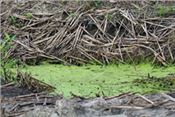Tips On Getting Rid Of Flood Debris
COLUMBIA, MO.
When floodwaters recede, farmers have to deal with the debris left behind, says Kent Shannon, University of Missouri Extension field specialist in agricultural engineering.
You can burn plant materials such as cornstalks and tree wood in the field or ditch where they lie. Bury the ashes in the same field. If crop residue is not too deep, mix it into soil with normal tillage.
An executive order signed by Gov. Mike Parson gave the Missouri Department of Natural Resources authority to temporarily waive or suspend department regulations to serve the interests of public health and safety during flooding and recovery.
Shannon outlines the following waivers that went into effect in April:
Disposal of yard wastes and major appliances in sanitary landfills
This waiver allows sanitary or demolition landfills to accept damaged or destroyed major appliances and yard wastes generated during the severe weather and flooding. However, landfills are not required to allow these types of waste, so check with your landfill operator. DNR encourages recycling of appliances and compost or mulch yard waste when possible.
Burning vegetation and untreated wood waste
The department waived state permit requirements and will not require use of an air curtain incinerator for burning vegetation and untreated wood waste in all areas affected by flooding. This waiver does not apply to local ordinances or permits.
The material must be untreated wood or vegetation and be the result of weather and flooding occurring after March 11.
Within city limits, burn the materials on the premises where they came from or at a designated central collection point approved by local fire officials.
Outside of the city limits, burn at least 200 yards from the nearest occupied structure. Larger setbacks may be appropriate depending on circumstances, such as the size of the debris pile. Locations may also require approval by local fire officials.
For more information, contact DNR regional offices:
• Kansas City: 816-251-0700
• Northeast (Macon): 660-385-8000
• St. Louis: 314-416-2960
• Southeast (Poplar Bluff): 573-840-9750
• Southwest (Springfield): 417-891-4300
More information about handling debris from storm damage is available from DNR at https://dnr.mo.gov/disaster.htm . ∆

In the aftermath of floodwaters, farmers face the difficult task of removing debris from their land.
Photo by Linda Geist